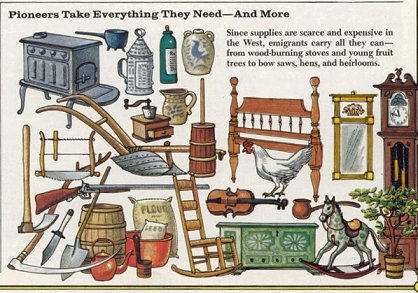copyright © 2007
Provisions
compiled by Stephenie Flora
copyright
©
2007
![]()

Illustration
from: Story of the Great American West. The Reader's Digest Association, Inc,
1977
Randolph B. Marcy, Captain, US
Army stated in his guidebook, The Prairie Traveler:
"Supplies
for a march should be put up in the most secure, compact, and portable shape.
Bacon should be packed in strong sacks of a hundred pounds
to each; or, in very hot climates, put in boxes and surrounded with bran, which
in a great measure prevents the fat from melting away.
If
pork be used, in order to avoid transporting about forty percent of useless
weight, it should be taken out of the barrels and packed like the bacon; then
so placed in the bottom of the wagons as to keep it cool. The pork, if
well cured, will keep several months in this way, but bacon is preferable.
Flour should be packed in stout double canvas sacks well sewed,
a hundred pounds in each sack.
Butter may be preserved
by boiling it thoroughly, and skimming off the scum as it rises to the top until
it is quite clear like oil. It is then placed in tin canisters and soldered
up. This mode of preserving butter has been adopted in the hot climates
of southern Texas, and it is found to keep sweet for a great length of time,
and its flavor is but little impaired by the process.
Sugar
may be well secured in India-rubber or gutta-percha sacks, or so placed in the
wagon as not to risk getting wet.
Desiccated or dried
vegetables are almost equal to the fresh, and are put up in such a compact and
portable form as easily to be transported over the plains.....They are prepared
by cutting the fresh vegetables into thin slices and subjecting them to a very
powerful press, which removes the juice and leaves a solid cake, which, after
having been thoroughly dried in an oven, becomes almost as hard as a rock. A
small piece of this, about half the size of a man's hand, when boiled, swells
up so as to fill a vegetable dish, and be sufficient for four men...........
Pemmican, which constitutes almost the entire diet of the
Fur Company's men in the Northwest is prepared as follows: The buffalo
mean is cut into thin flakes, and hung up to dry in the sun or before a slow
fire; it is then pounded between two stones and reduced to a powder; this powder
is placed in a bag of the animal's hide, with the hair on the outside; melted
grease is then poured into it, and the bag sewn up. It can be eaten raw,
and many prefer it so. Mixed with a little flour and boiled, it is a very
wholesome and exceedingly nutritious food, and will keep fresh for a long time.
The most portable and simple preparation of subsistence that
I know of, and which is used extensively by the Mexicans and Indians, is called
'cold flour'. It is made by parching corn, and pounding it in a mortar
to the consistency of coarse meal; a little sugar and cinnamon added makes it
quite palatable. When the traveler becomes hungy or thirsty, a little
of the flour is mixed with water and drunk. It is an excellent article
for a traveler who desires to go the greatest length of time upon the smallest
amount of transportation. It is said that half a bushel is sufficient
to subsist a man thirty days."
When figuring the amount of food
required for the journey from the Missouri River to California (110 days)
it was determined that for every grown person there should be a required allotment
of:
Flour or it's equivalent in hard
bread 150 lbs
Bacon or Pork 25 lbs
Coffee
15 lbs
Sugar 25 lbs
Yeast powders
for making bread
Salt and Pepper
Fresh
beef driven on the hoof
![]()
My name is Stephenie Flora. Thanks for stopping by. Return to [
Home Page ] All [
Comments and Inquiries ] are welcome.